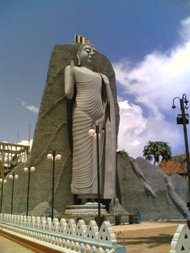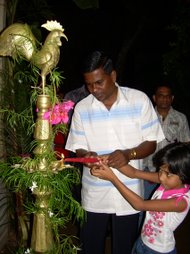A few months ago after the fall of the East, a prominent Sinhalese expatriate had toured the area and a luncheon meeting was arranged in an Indian restaurant in a five star hotel in Colombo. There were four of us for lunch including a senior government official. The expatriate explained his observations and concluded that everything was fine but for one factor which was of concern. The government official inquired what it was and the expatriate answered that it was the "Muslim issue". There was an uncomfortable momentarily silence at the table, after which the official remarked "you don’t need to worry about the Muslims, worry about the LTTE".
What I heard that day was not isolated. It is a concern that I hear expressed privately in every strata of Sinhalese society, very frequently. I also hear these same concerns in the United Kingdom, again in every strata of English society. The latest was at the start of this summer at "Regatta", an Italian restaurant in Winchmore Hill, North London, when the topic came up for discussion during dinner with some English friends who are prominent businessman in the area. Their 16-year old daughter summed up their concerns by stating that the dress code of Muslim women was "scary".
In Sri Lanka and in the United Kingdom, the Muslim population is growing, primarily because of the lack of the use of birth control. This rise in population itself causes concern and social destabilisation.
In both countries the increase in population is particularly prominent at the less affluent levels, where there is considerable strain placed on scarce resources such as land, employment, access to educational and medical facilities etc. In both countries the social tensions created prevent the smooth assimilation/interaction among differing ethnic groups, resulting in underprivileged ghettos and in creased susceptibility to radical Islam. It is a recipe for social and political conflict and confrontation.
A few decades ago, both Catholics and Muslims were reluctant to use birth control because of social and religious reasons. Before that the Sinhalese had huge families. But over the years, increased access to education has made more and more Buddhists and Catholics practice birth control and reap the benefits of stable population growth and a reduction in political and social tensions.
Among the Muslim community too, the more educated and affluent Muslims tend to practice birth control and they are the ones who have been far more successful in interacting with the other ethnic communities. The newer affluent generations of Muslims tend to be more progressive and understand the sensitivities at play and the need to compromise antiquarian religious and cultural practices for ethnic harmony and political and social stability.
Recently, a Muslim explained to me the politics of the minaret. In the middle ages, the Mullahs used the minarets to call the faithful who were mainly scattered goat herders in the barren lands of the Middle East to prayer.
This was understandable. Goats and their herders did wonder in those far-off barren lands.
Today, in metropolitan Colombo and London, during the age of the digital watch, Mullahs are broadcasting the call to prayer via loudspeaker. Pray, where are these goat herders in London and Colombo who do not have a digital watch? Not to be beaten, the Buddhist monks too have taken to broadcasting their prayer in Colombo via loudspeakers.
Those who use these loudspeakers seem unaware and unconcerned by the irrelevancy of their actions in modern society and the nuisance they cause to others.
Of the three major ethnic communities in Sri Lanka, the Muslims are socially, culturally and religiously the most distant from the other two communities. Therefore social and political stability and cohesion is a matter of priority.
Islamic fundamentalism, the changes in dress code of some Muslim women, increase in conservatism among Muslim men etc are causing concern both among the Sinhalese in Sri Lanka and among the English in Britain, amidst a trend of increasing Muslim population growth in both countries and the formation of low income ghettos breeding a culture and a mind set alien to Sri Lanka or Britain and more in tune with the Middle East.
To ease tensions and address misconceptions there needs to be a positive and a transparent dialogue. While the government is aware of all the issues and fundamentalist elements in the East, they are at present reluctant to address these issues or open a positive dialogue, primarily because of internal and external political alliances.
Internally there are powerful Muslim politicians aligned to the government and they are fearful that opening a dialogue and addressing issues may effect their popular vote. Externally there are close alliances with Islamic nations such as Pakistan, Iran, Saudi Arabia etc.
The Government is more inclined to allow their powerful Muslim politicians to handle the Muslim community. Isn’t this what we did in the last century, allowing the powerful Tamil politicians to handle the Tamil community. Look where it has got us.
Unfortunately for the government and the Muslims, the Sinhalese majority are not concerned about such alliances and for them the "Muslim issue" is a matter of concern, no different to that found in the United Kingdom among the English.
It’s an issue that needs to be addressed, to reduce tensions and improve social and ethnic relations as was found between the Sinhalese and the Muslims after the Tsunami. The Muslims were the most affected during the Tsunami as they are concentrated in ethnic enclaves hugging the coast.
BBC and CNN reported a Buddhist monk from an interior temple for the first time visiting a coastal mosque near Beruwala and bringing food and other necessities to help the Muslims. It was a refreshing gesture. The Muslims were visibly surprised and it made the International news. This was clearly a positive development in ethnic unity and harmony, which needs to be encouraged.
Compare this to a senior DIG in the MSD unit a few years ago, under the previous regime, extracting money from a prominent Muslim businessman, while exercising near the Kotte Parliament stating "you Muslims have plenty of money". Reality is that an overwhelming proportion of Muslims are poorer than their Sinhalese and Tamil brethren and have a lower level of educational attainment as a community in comparison with the others.
There needs to be a transparent dialogue, to address issues by both communities in a constructive manner so that there would be better understanding and harmony. If we had such a dialogue 50 years ago, we may have been able to pull the carpet from under the Tamil nationalists/facists and avoid the present carnage. History must not be repeated.
Britain is having a dialogue with their Muslim communities in trying to defuse tensions and it is time for Sri Lanka to begin a similar process.
Poor governance in Sri Lanka results in the state not having adequate political processes to address and defuse social and ethnic tensions.
The press is also partisan and weak. A long standing American citizen of Sri Lanka explained that when he wakes up on Sunday morning and reads the newspapers it is as if he is living in several different countries at the same time.
These weaknesses results in the problem becoming exacerbated and then the state responds with last minute fire fighting exercises at great cost to the nation, using the police and the security forces to contain what should have been addressed politically




No comments:
Post a Comment